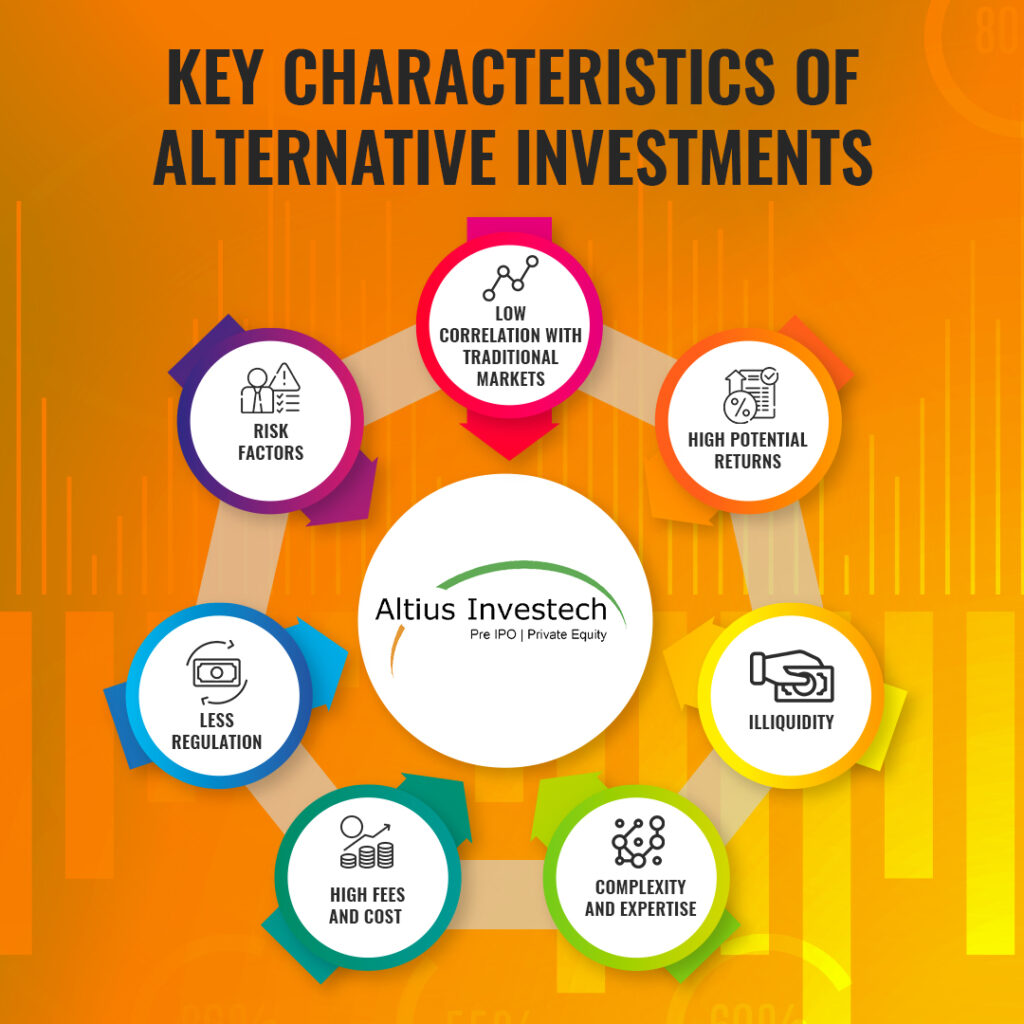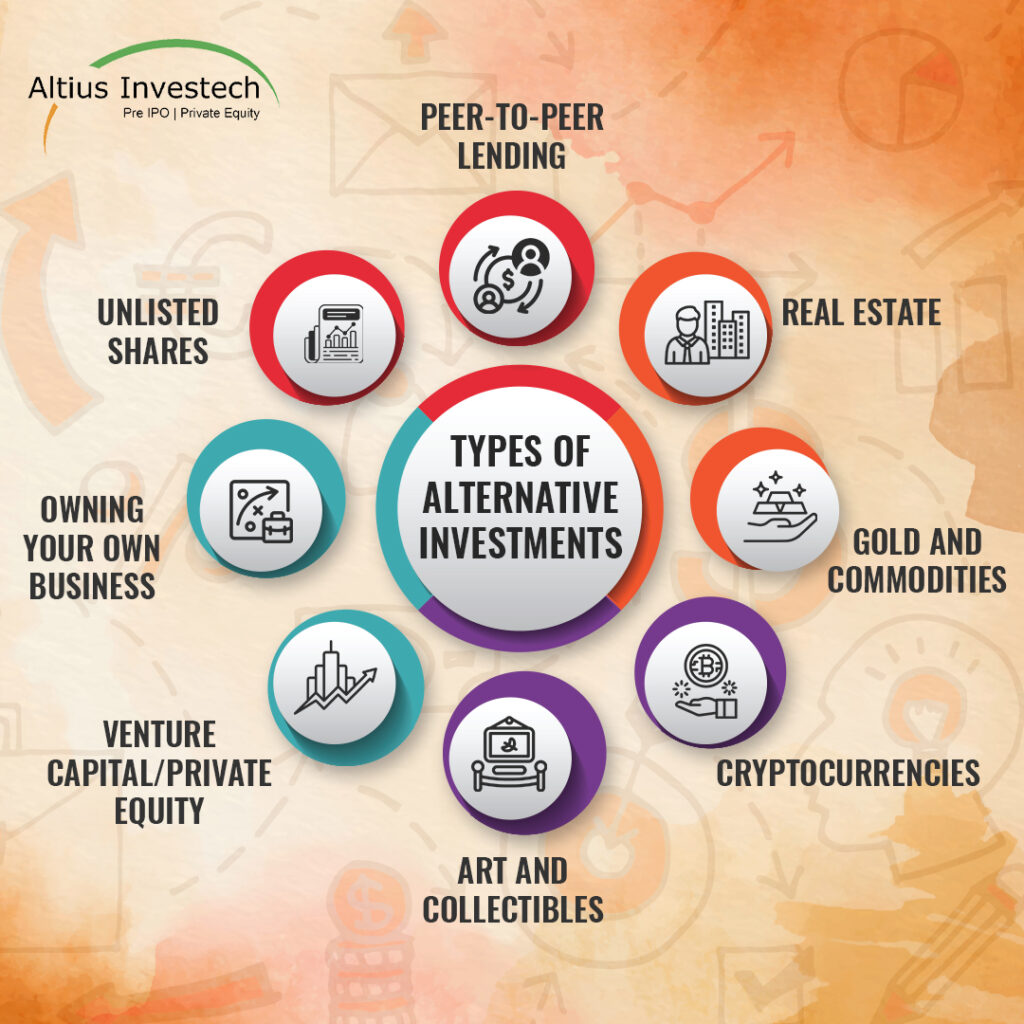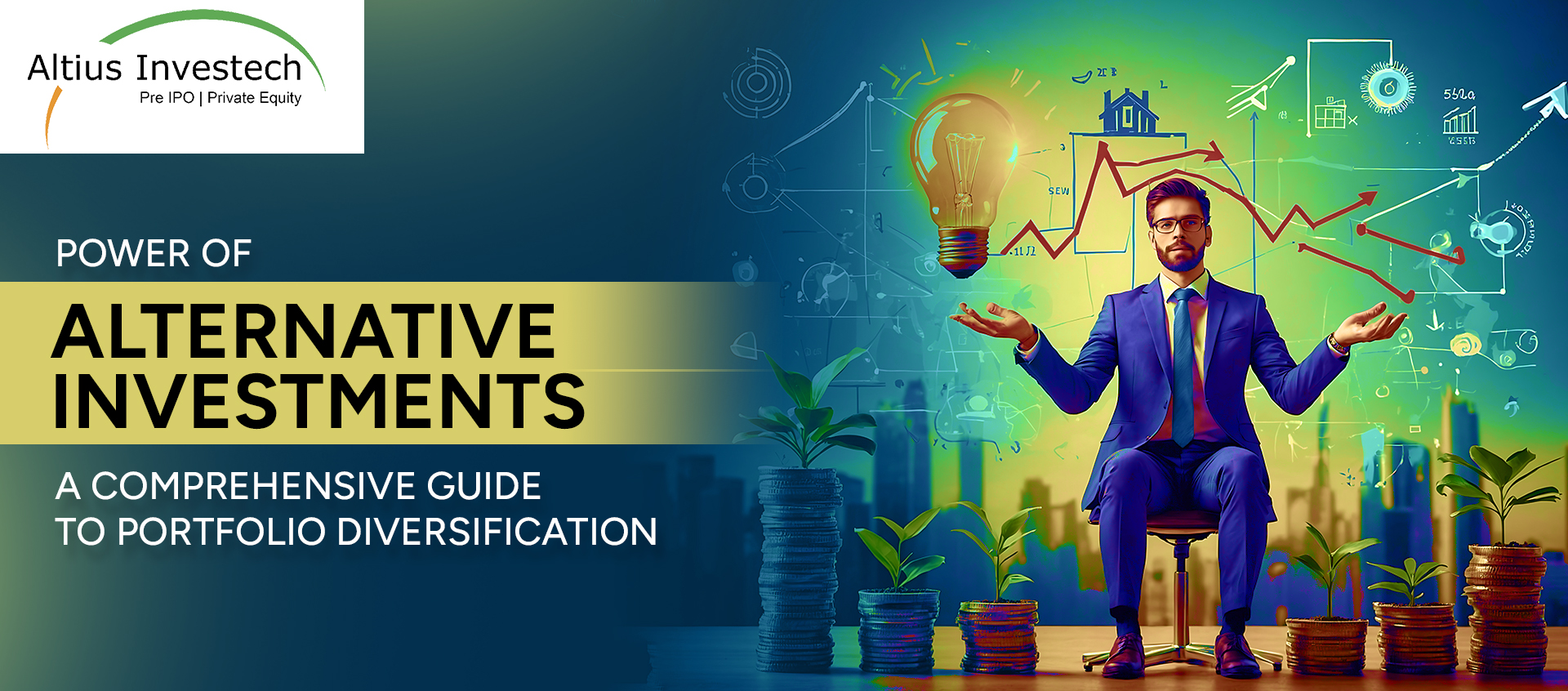Blog Highlights
- Key Characteristics of Alternative Investments
- Types of Alternative Investments
- Unlisted Shares as an Alternative Investment Option
- Advantages of Unlisted Shares
Power of Alternative Investments: A Comprehensive Guide to Portfolio Diversification
Alternative investments are financial assets that fall outside the realm of traditional investment categories like stocks, cash, and bonds. These include a wide range of asset classes such as private equity, hedge funds, real estate, cryptocurrencies, commodities, and unlisted shares. Alternative assets, unlike conventional investments, often allow opportunities for portfolio diversification and access to non-traditional markets. They appeal to investors who seek high returns, unique opportunities, or ways to hedge against market volatility.
Alternative investments gain popularity among institutional investors, high net-worth individuals, and hedge funds, due to the potential for high returns and unique behavior of the market. They are often less accessible to retail investors, despite advancements in technology that have made it possible to democratize access to some of the asset classes, such as fractional ownership of the art of real estate. The investments would be able to provide exposure to emerging trends in the market, early-stage companies, or niche sectors, which are available through conventional markets.

Key Characteristics of Alternative Investments
These investments are distinct from traditional assets for several reasons-
1) Low Correlation with Traditional Markets
Alternative investments exhibit a low correlation with traditional assets such as bonds and stocks. This means they perform independently of broad market trends, giving a potential hedge against market volatility and improving portfolio diversification.
2) High Potential Returns
Private equity or venture capital would offer the potential for returns, often outpacing those of traditional investments. But, higher returns come with increased risk and are not guaranteed.
3) Illiquidity
They cannot be easily bought or sold as publicly traded assets. For instance, private equity or real estate investments often need a long holding period, thereby limiting access to capital.
4) Complexity and Expertise
Investments often require a deep understanding of specific market dynamics, risk management, and due diligence. Alternative assets like private equity or hedge funds include complex investment strategies including derivatives, and leverage, among other sophisticated financial instruments.
5) High Fees and Cost
These investments involve high management fees and performance-based incentives, as compared to traditional investments. For eg, hedge funds charge both performance fees and management fees, having an impact on the net returns.
6) Less Regulation
Many alternative investments are subject to few regulatory requirements, which makes them less transparent and more susceptible to risks like fraud. Investors should perform extensive due diligence to understand the potential rewards and risks.
7) Risk Factors
All of these assets come with risks. For instance, real estate is subjected to property value fluctuations and market demand, while cryptocurrencies are volatile and face regulatory uncertainties. Understanding the risk factors would crucially manage investments effectively.
Types of Alternative Investments

These investments are financial assets differing from traditional investments like bonds, stocks, and cash. They often provide high returns, diversification, and unique opportunities, coupled with varying degrees of risk.
1) Peer-to-Peer Lending: Online platforms connect borrowers with investors, offering a higher interest rate than traditional savings. P2P lending platforms connect individual borrowers with investors, cutting out on traditional banking middlemen, and letting investors earn higher interest rates than typical savings accounts as well as bonds.
2) Real Estate: Investing in physical properties directly or through Real Estate Investment Trusts (REITs) provides stable income and potential appreciation. Direct ownership offers stable income through rent and potential appreciation of property, while REITs give a more liquid way of investing in real estate. Both methods diversify portfolios while offering a hedge against inflation.
3) Gold and Commodities: Investing in tangible assets like gold and agricultural products helps hedge against currency fluctuations or inflation. Gold, especially, has been a popular choice for centuries as it provides a safe haven during economic downturns. Commodity investments can be made through futures contracts, physical ownership, and commodity ETFs.
4) Cryptocurrencies: Digital currencies like Bitcoin and Ethereum offer high volatility but the potential for significant returns. Due to their volatility and the rapidly growing blockchain technology, cryptocurrencies offer the potential for significant returns. However, investors must also be prepared to lose their entire investment because of their extreme volatility.
5) Art and Collectibles: Investing in art, antiques, or memorabilia can provide substantial returns, with platforms like Masterworks allowing fractional ownership in high-value art pieces. Art and collectibles require specialized knowledge, instance costs, and storage, and can be illiquid.
6 ) Venture Capital/Private Equity: Investing in startups or private companies before they go public offers early entry into potentially disruptive businesses. These investments provide early entry into potentially disruptive businesses, often yielding high returns if the company succeeds or goes public.
7) Owning Your Own Business: Starting or investing in a small business can offer high returns, with direct control over the investment’s direction.
8) Unlisted Shares- Investments in unlisted shares offer the chance to participate in the company’s growth at early stages, at lower valuations in comparison to public markets.
Unlisted Shares as an Alternative Investment Option
Unlisted shares represent equity in companies that do not remain listed on main stock exchanges. The companies are in the early stages of pre-IPO phases, thereby showing a unique opportunity for investment.
Unlisted shares investments have gained popularity lately as an alternative investment option, especially for investors who want to diversify their portfolios beyond the traditional stock market.
Advantages of Unlisted Shares
Investing in unlisted shares through platforms like Altius Investech lets early investors become part of companies that have the potential for high growth. This early access causes significant returns when the company eventually goes public or remains acquired at a premium.
They add a layer of diversification to an investment portfolio, reducing reliance on listed equities, traditional assets, and bonds.
As unlisted companies are often in the growth phase, they offer high returns in comparison to the listed companies, leading to substantial profits when the company scales up.
Multiple unlisted companies operate in niche markets or are involved in cutting-edge technologies, which lets investors participate in unique business models.
If you’re interested in investing in unlisted shares, be sure to read our blogs dedicated to this topic for valuable insights and guidance.
- 5 Advantages of Buying Unlisted Shares in 2024
- Demystifying Unlisted Shares: How They Work
- Mitigating the Risks of Buying Unlisted Shares
- Income Tax on Capital Gains in Unlisted Shares
- Listed Vs. Unlisted Shares: Assessing Risk and Reward
- Top 5 Unlisted Shares You Should Consider Buying in India in 2024
Final Thoughts
Alternative investments are best suited for investors with high-risk tolerance, a proper understanding of market dynamics, and the capacity to endure potential volatility. With the evolving financial landscape, alternative investments continue to gain traction, offering great ways to build wealth and capitalize on emerging trends. Thorough due diligence, informed strategies, and a clear understanding of risk tolerance would be critical in navigating alternative investments.
GET IN TOUCH WITH US
For any query/ personal assistance feel free to reach out at support@Altiusinvestech.com or call us at +91-8240614850.
For Direct Trading, Visit – https://altiusinvestech.com/companymain
FAQs
Ans:- Financial assets outside traditional categories like stocks, bonds, and cash.
Ans:- For potential higher returns, diversification, and access to unique markets.
Ans:- Investors with a higher risk tolerance and a desire to diversify their portfolios.
Ans:- They come with risks, including illiquidity and regulatory challenges.
Ans:- Through private brokers, private equity funds, or employee stock options.
Ans:- High growth potential, diversification, and less market volatility.
Ans:- Complexity, higher fees, and regulatory risks.
Ans:- Some alternative investments offer tax benefits, but it depends on the asset type.
Ans:- They can be, but careful consideration of risks and liquidity is necessary.
Ans:- Research the options, understand the risks, and consider consulting with a financial advisor.

